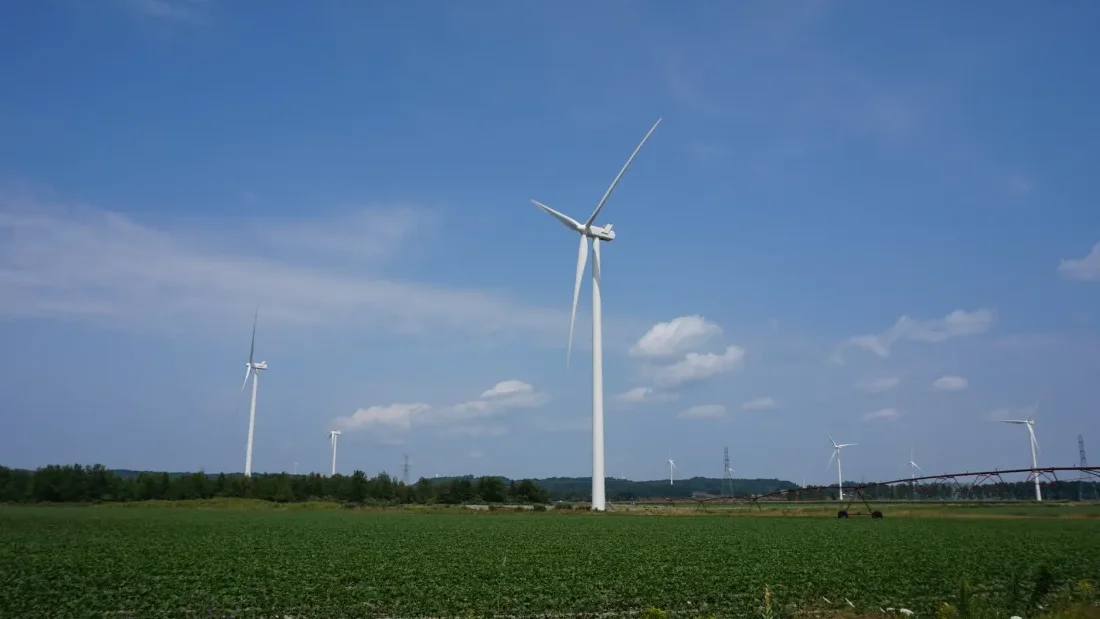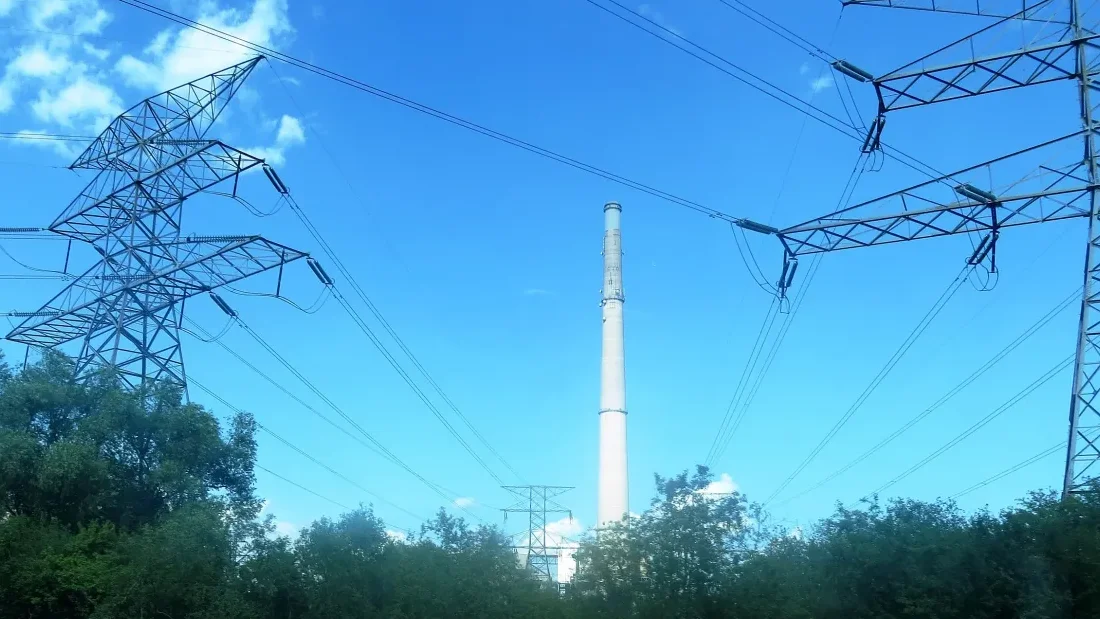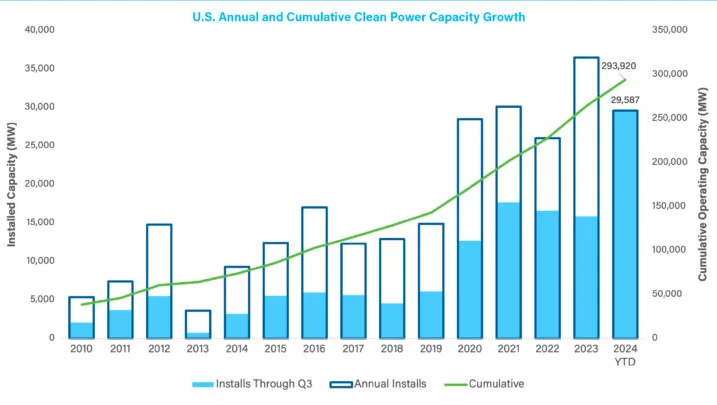
A long-running local government collaboration in southwestern Minnesota is helping to insulate the region from the kind of controversies and misinformation that have plagued rural clean energy projects in other states.
The Rural Minnesota Energy Board has its origins in a regional task force that was set up during the mid-1990s as the state’s first wind farms were being built. The task force was instrumental in persuading state legislators in 2002 to create a wind energy production tax, which today generates millions of dollars in annual revenue for counties and townships that host wind projects.
The group’s scope and membership has since gradually expanded to include 18 rural counties that pay monthly dues for support on energy policy and permitting. The board represents members at the state legislature and in Public Utilities Commission proceedings. At home, it facilitates community meetings with project developers, helps draft energy-related ordinances, and educates members and the public on the benefits of energy projects.
The result, say clean energy advocates and developers, has been a uniquely consistent approach to local energy policy and permitting that makes it easier for renewable companies to do business in the region.
“The rural energy board has been a critical, important body and one of the major reasons why renewable energy has been successful in southwestern Minnesota,” said Adam Sokolski, director of regulatory and legislative affairs at EDF Renewables North America. “Their policies have encouraged good decision-making over the years and led to a stable and productive region for energy development.”
EDF Renewables has worked with the board on at least nine projects in the region. Sokolski said he’s come to admire its approach to policy making, its support for transmission projects, and its efforts to educate members on clean energy.
“It’s positive to have county leaders talking to each other about energy projects, about how … they can approach those projects so they best benefit their constituents and the public,” he said.
Southwest Minnesota has the state’s densest concentration of wind turbines and is increasingly attracting solar developers, too. Wind turbines account for more than 4,500 megawatts, or around 22%, of the state’s generation capacity, making Minnesota a top 10 state for wind production.
The board counts the wind production tax among its most significant accomplishments. Large wind farms pay $1.20 per megawatt-hour of generation. Counties receive 80% of the revenue, with the remainder going to townships. A similar fee also exists for large solar projects.
The fee delivers millions of dollars annually, allowing local governments to construct buildings and repair bridges and roads without raising their levies for years. According to American Clean Power, Minnesota municipalities receive $44 million annually in taxes, and private landowners receive nearly $41 million in lease payments from wind and solar companies.
That has enabled counties to stave off opposition by pointing out that turbines and solar are economic development, according to Jason Walker, community development director for the Southwest Regional Development Commission, which manages the board, said the local government revenue generated from wind and solar projects has helped reduce opposition to projects.
“It’s all economic development here,” Walker said.
When opposition does emerge, such as around a recent 160 megawatt solar project in Rock County in the state’s far southwest corner, the board works with commissioners to make sure local leaders have factual information as opposed to misinformation.
Peder Mewis, regional policy director for the Clean Grid Alliance, praised the board for creating an information-sharing culture among members that helps prepare them for clean energy development. He said many developers appreciate that the region’s ordinances are similar because of the board, and that they have maintained good relationships with members over the years.
“There are other parts of the state that are thinking, ‘Is there something here that we could replicate or duplicate?’” Mewis said.
Jay Trusty, executive director of the Southwest Regional Development Commission, said the board plays an essential role in lobbying for state policy to support clean energy development. In addition to the production taxes, the board regularly defends the local distribution of those funds when lawmakers consider other uses for the revenue. The board more recently lobbied for changes to the state transmission permitting process, which were approved this year, and it supported an expansion for Xcel Energy’s CapX 2020 high-voltage transmission project before state utility regulators.
Minnesota Public Utilities Commissioner John Tuma recalled the board’s support for the state’s 2008 renewable energy standard, which gave Republican Gov. Tim Pawlenty important rural support for signing the legislation.
“They bring an economic voice to the table,” Tuma said, adding that the board continues to be active in conversations about regional grid policies.
Nobles County Commissioner Gene Metz has served on the board for 12 years. The region’s decades of experience and collaboration on wind energy has helped make residents more comfortable with clean energy projects, he said, leading to fewer controversies.
In counties outside the board’s territory, “they’re getting more pushback, especially on solar projects,” he said.
Gene’s cousin, Chad Metz, serves as a commissioner in Traverse County, which is not a member and has a mortarium on clean energy projects. Chad Metz sees clean energy as inevitable and wants the county to join the rural energy board to protect its economic interests. “The benefits outweigh the negatives, and it will just become part of life,” he said.

Gov. Janet Mills wants to make a new department focused on the state’s energy needs and goals.
In her upcoming biennial budget proposal that is expected on Friday, Mills will outline her plan for the current Governor’s Energy Office to be elevated to a cabinet-level department. This would be a budget-neutral initiative that would allow for more comprehensive and consistent management of Maine’s energy system, according to a news release from the governor’s office Wednesday.
If the budget proposal is approved by the Maine Legislature, the Governor’s Energy Office would transition to the Maine Department of Energy Resources by the end of this year. It would be led by a commissioner, who would be appointed by the governor and subject to legislative confirmation.
In recent years, the Maine Legislature has significantly expanded the responsibilities of the Governor’s Energy Office. For example, the office has secured more than $200 million in federal funding to support grid resilience and innovation, energy efficiency and workforce development.
“By designating a cabinet seat focused solely on energy issues, Maine will be in a stronger position to deliver more affordable energy, advance our energy goals, and grow the state’s economy,” said Dan Burgess, director of the Governor’s Energy Office.
The new energy department would be the lead agency on energy resources, policies, planning, data, markets, energy security and program implementation; all of which currently fall to the Governor’s Energy Office.
Like those in other states, Maine’s new department would have additional authority to conduct competitive energy procurements to meet the state’s power demands and reliability needs. It would also continue to coordinate with the Maine Public Utilities Commission and other state, regional and federal partners.
State law requires Maine to transition to renewable energy and reduce greenhouse gas emissions; however, it must be done while ensuring that Mainers will still have access to affordable, reliable and secure energy, said Maine Sen. Mark Lawrence (D-York) and state Rep. Melanie Sachs (D-Freeport), who serve as co-chairs of the Maine Legislature’s Energy, Utilities and Technology Committee, in a joint statement.
In 2022, Mills signed into law a state goal to achieve carbon neutrality by 2045. The next year, she set a new target of 100% clean electricity by 2040. She also established the Maine Climate Council, which is responsible for maintaining the state’s four-year roadmap to meeting those and other climate goals.
“Regular planning, evaluation, and education delivered by a dedicated agency will ensure the consistency needed to keep Maine on a path toward these goals,” Lawrence and Sachs said in the release. “There’s a reason why this concept has been proposed previously in bipartisan fashion.”
Maine also has a goal of creating three gigawatts of offshore wind in the Gulf of Maine — enough to power between 675,000 and 900,000 homes — installed by the end of 2040. While the state was awarded a lease for a research array with up to 12 floating turbines to help inform how floating offshore wind operates and interacts with ecosystems in the water, the future of the renewable energy source hangs in the balance with President-elect Donald Trump having said he would seek to halt all offshore wind projects.
In 2017, during the LePage administration, state Rep. Kenneth Fredette (R-Newport) introduced legislation to establish an energy seat in the cabinet that would be responsible for energy planning, data analysis and the implementation of an oil dependence reduction plan. The bill was supported by the Legislature’s energy committee at the time, but died upon adjournment.
The Maine State Chamber of Commerce said Wednesday it supports Mills’ proposal, noting that energy is one of the most pressing issues for the state’s economy.
“Addressing energy affordability and meeting our state’s climate targets will require careful planning and execution and the Chamber looks forward to working with the Administration on those efforts with a cabinet-level Energy Department leading that effort,” said President and CEO Patrick Woodcock in the release.

OFFSHORE WIND: An offshore wind developer tables a planned wind farm after Connecticut failed to join Massachusetts and Rhode Island in agreeing to buy power from the project. (WBUR)
ALSO:
CLIMATE:
FOSSIL FUELS: Neighbors of a former refinery site in Philadelphia worry about the potential environmental and health impacts of plans for a warehouse and life sciences complex and liquefied natural gas and butane storage. (Inside Climate News)
TRANSMISSION: Maryland legislators have at least four bills in the works to modify or stop a widely opposed transmission line through the state — a plan that has drawn state policymakers’ attention away from other energy and climate issues this year. (WBAL, Maryland Matters)
GRID: Pennsylvania Gov. Josh Shapiro files a federal complaint against PJM, arguing that the grid operator’s market rules are “currently failing” and will result in soaring electricity prices. (Reuters)
TRANSPORTATION: New York’s plan to impose an extra toll on drivers in some parts of Manhattan is set to go into effect this weekend despite a pending legal challenge from New Jersey. (Gothamist)
ELECTRIC VEHICLES:
UTILITIES: A Spanish energy company purchases the parent company of electric utilities in Connecticut, Maine, and New York in a $2.5 billion deal that critics say will reduce transparency and accountability. (Maine Public)
STORAGE: Maine recommends that the state public utilities commission procure 200 MW of battery capacity to manage storage and deployment of solar and wind power and avoid costly grid upgrades. (Portland Press Herald, subscription)

The last time President Donald Trump took office, Illinois had just passed the Future Energy Jobs Act (FEJA), creating an ambitious renewable electricity mandate, solar incentive programs, green job training and equity provisions to propel the state’s clean energy economy.
That progress is offering both a blueprint and a source of hope for Illinois clean energy and environmental justice advocates as they try to keep the state’s clean energy transition on track during a second Trump presidency.
“The state policy is designed to be responsive to a lack of federal climate leadership, to the need for Illinois to step up into a position of climate leadership,” said Vote Solar deputy Midwest program director John Delurey, who added that since the 2024 election “I’m at the point where I can channel my existential dread into state-based action.”
Illinois lawmakers expanded on FEJA with the Climate & Equitable Jobs Act (CEJA) in 2021, and advocates expect another state energy bill in 2025 to prioritize energy storage and otherwise further clean energy goals, including planning for the mandatory closing of almost all fossil fuel generation by 2035.
“With CEJA we’ve mapped out an ambitious climate plan, and we’re in a strong position to further those goals even under a Trump administration,” said Madeline Semanisin, Midwest equitable building decarbonization advocate for the Natural Resources Defense Council. “This is not the first Trump administration. States and cities are more prepared this time to accelerate initiatives at the state and city level.”
That’s not to say the state won’t be affected by a president who is hostile toward clean energy policy. Several federal tax credits and grants that have helped accelerate progress in Illinois could be at risk under Trump, and a rollback of federal environmental regulations or enforcement could prolong pollution from coal ash, power plants and other sources.
James Gignac, Union of Concerned Scientists lead Midwest senior policy manager for the Climate & Energy program, said he thinks of the state’s clean energy outlook in terms of headwinds and tailwinds, which will continue to shift based on economic and political factors beyond the state’s control.
“States for many years have not been able to rely on the federal government for climate action, whether due to politics or the Supreme Court,” Gignac said. “The election results will make it harder to achieve the goals that Illinois has established. It doesn’t fundamentally change the energy policy path that the state is on, it just makes it even more urgent that state legislators pass additional policies.”
Federal funds from the Inflation Reduction Act, Bipartisan Infrastructure Law and other federal programs have helped Illinois and individual cities and counties carry out their clean energy goals. Illinois was awarded more than $430 million in a Climate Pollution Reduction Grant for implementation of the state’s goals on industrial decarbonization, clean energy, clean transportation and freight, climate-smart agriculture, and building energy efficiency.
Illinois was also awarded $156 million in federal Solar for All funds to bolster solar and equity goals including workforce training, residential solar deployment, and community engagement.
Illinois advocates and experts said they expect federal funds that have already been awarded to be paid out, and they don’t expect the Trump administration and Republican-dominated Congress to make major changes to the IRA or infrastructure law, especially given the financial impact those laws have had in Republican-dominated areas.
“We have seen hundreds of thousands of dollars for small businesses and farmers” paid out through the federal Rural Energy for America Program (REAP), not to mention federal IRA funds, that “overall are benefitting Republican districts” during the Biden administration, noted Angela Xu, Illinois Environmental Council municipal engagement manager.
Even if new federal funding windfalls are not available in the future, advocates say the funds awarded during the Biden administration will have lasting impact, combined with state-level programs and funding sources that will continue, and market forces that are making clean energy increasingly competitive.
“President-elect Trump has indicated his intention to roll back IRA programs, but keep in mind that when President Trump was elected last time, he and the Republican-led Senate and House were hellbent publicly on rolling back Obamacare, and that didn’t happen,” said Environmental Law & Policy Center executive director Howard Learner.
“The IRA has supported smart, sensible renewable energy development in red states and blue and purple states,” he added. “There’s no question if President Trump tries to cut back and constrain the IRA, it will have some impact on the pace of renewable energy development and other climate change solutions. On the other hand, it’s very hard to keep better technology from growing. When new technologies come to the market and they are better and cleaner and economically sensible, they tend to accelerate and capture more market share.”
Illinois Shines, the program creating lucrative Renewable Energy Credits for distributed solar, is funded through ratepayer payments — so it is not dependent on federal funding. That doesn’t mean it is immune from federal action, since the federal Investment Tax Credit and the global solar market influence the viability of projects in Illinois.
“There are levers they can pull, through an act of Congress they can change the ITC, which is an important part of the value stack for renewables,” said Delurey, of Trump and his allies in Congress. “And they could deploy tariffs which make the landscape a lot more complicated. The U.S., thanks to the IRA, is making its way towards onshoring and bringing a lot of manufacturing back stateside, but we’re not quite there yet.”
If the tax credit is reduced or solar panels get more expensive because of tariffs, Illinois’s incentives “would probably have to be adjusted accordingly,” Delurey said, with bigger incentives for each project.
“It would just mean fewer megawatts and kilowatts in Illinois. We’d still be deploying solar, but it is sensitive to the price of clean energy.”
Advocates agree that the Biden administration’s Justice 40 mandate, that 40% of the benefits of many federal climate and other programs go to disadvantaged communities, is likely to be ended or ignored by the Trump administration.
Lower-income and marginalized communities could also be affected by understaffing, delays or rollbacks in federal programs like LIHEAP, which provides energy bill assistance, and energy efficiency rebates for low-income households.
“We can put things in state legislation that supports these communities,” including in the Illinois energy bill being drafted for introduction in 2025, Semanisin said. “Justice 40 is a framework we can incorporate in state legislation as well, to prioritize people who have been historically underserved.”
During his first administration, Trump made significant rollbacks to coal plant wastewater protections, and to the 2015 federal rules governing the storage and cleanup of coal ash. Both are big issues in Illinois, where eight coal plants are still operating, and coal ash is stored in 76 ponds, landfills and other sites, according to an Earthjustice analysis.
Earthjustice senior attorney Jenny Cassel said experts anticipate Trump will again try to weaken the Clean Water Act and coal ash protections. Meanwhile it’s likely the EPA under his administration will do little to enforce the coal ash regulations, which was largely the case before the Biden administration made coal ash a priority.
Illinois passed its own state coal ash rules in 2019, after lobbying by activists who wanted to make sure the rules were at least as strong as federal rules and covered legacy ponds not included in federal rules at the time. In 2024, the federal rules were expanded to cover legacy ponds as well as historic ash and coal ash landfills, but that provision is being challenged in federal court. The state rules do not cover ash historically dumped or scattered around, and they also do not cover inactive coal ash landfills.
Meanwhile the implementation of the Illinois coal ash law has been extremely slow. The law requires each site to get an operating permit with pollution limits that can then be enforced, but so far only two permits at one coal plant site have been issued, Cassel said.
“We keep hearing excuse after excuse” from the Illinois EPA that issues the permits, Cassel said. “‘We don’t have enough people, they’re tied up in administrative hearings, conditions are changing,’ every dog-ate-my-homework excuse in the book.”
“At the federal level, there’s any number of potential ways they could attempt to roll back the [coal ash] rules, or weaken areas that haven’t been fully defined,” she added. “That’s certainly what they did in round one. Illinois will really have to step up into the vacuum of protectiveness we expect at the federal level.”
Chicago — site of the 2024 Democratic National Convention — has long been a target of Trump’s ire, and Chicago officials during his last administration and today are outspoken about countering Trump’s agenda.
Chief Sustainability Officer Angela Tovar said the city will continue its work on solar, electric vehicles and building decarbonization, as well as centering environmental justice in planning, zoning and enforcement decisions.
“So much of everyone’s local regulations hinge on things like the Clean Air Act and federal standards; there is going to be this question of federal preemption, what home-rule authority do we have?” Tovar said. “Those are still outstanding questions. Every rollback will present its own set of challenges for cities and states. What I am at least grateful for in being in the state of Illinois and the city of Chicago is we do have such robust climate leadership at the state and local level.”
The city’s environmental justice ordinance requires a holistic look at pollution — from traffic and other sources — when industrial development is proposed. That could help protect communities even if federal pollution limits are relaxed. The city has also launched an interdepartmental environmental justice working group, involving “every department that touches air, land and water,” as Tovar said.
The city program Green Homes Chicago funds energy efficiency upgrades for qualifying single- and multi-family homes, which could help fill the gap if federal home rebates are reduced, Tovar noted. Chicago Recovery Plan funding from federal pandemic relief and city bond issuances could help compensate for any funding that might be lost if IRA is undermined, she added.
“The role of cities and states becomes even increasingly more important right now,” Tovar said. “We have an ability to really demonstrate leadership in this moment. For cities like Chicago that have already made some progress, it’s up to us to ensure we’re sharing best practices and working together to really create those safeguards and fortify basic environmental and health protections at a local level. We’re certainly going to maintain our commitment, make sure we are rolling out our programs, and unwavering in our pursuit of environmental justice.”

Environmental and community advocates in Massachusetts argue that making too much room for biofuels in a pending state plan to decarbonize heating systems would slow the transition from fossil fuels and cause more pollution than a plan that prioritizes electric heat pumps.
As the state works on the creation of a Clean Heat Standard, a report released last month by Greater Boston Physicians for Social Responsibility raises questions about the effects using biodiesel in fuel-oil heating systems could have on air quality and public health, saying there is not enough information available about the pollutants released in the process.
Advocates say there is no such uncertainty about electric heat pumps, which create no direct emissions and should therefore be heavily favored in the new state policy.
“We absolutely think the thumb should be on the scale of electrification,” said Larry Chretien, executive director of the Green Energy Consumers Alliance. “If they give credit to biofuels, it ought to be conditional.”
Oil heating is much more prevalent in the Northeast than in the rest of the country. In Massachusetts, 22% of households are heated with oil, as compared to less than 5% nationwide. Moving homes and businesses off oil heat, therefore, is an important element of the state’s plan to achieve net-zero emissions by 2050, which sets a target of reducing emissions from heating by 93% from 1990 levels in that timeframe.
The process of developing a Clean Heat Standard began when then-Gov. Charlie Baker convened the Commission on Clean Heat in 2021. In 2022, the board recommended the creation of the standard, which was also included in the state’s Clean Energy and Climate Plan for 2050, released later that year. A stakeholder process began in 2023, and in the fall of that year the state released a draft framework for the standard that included the expectation of issuing credits for some biofuel use.
The program is expected to require gas utilities and importers of heating oil and propane to provide an increasing proportion of clean heating services like home heat pumps, networked geothermal, and other options, or buy credits from other parties that have implemented these solutions.
Whether the other options that qualify as clean heat will include biofuels — fuels derived from renewable, organic sources — has been a matter of contention since the idea for the system was first raised.
Climate advocates have tended to oppose the inclusion of much, if any, biofuel in the standard. Though biodiesel creates lower lifetime greenhouse gas emissions than its conventional counterpart, the recent Greater Boston Physicians for Social Responsibility report contends that there are many unanswered questions about how burning biodiesel impacts public health.
“Given the sheer amount of doubt, there’s more research that should clearly be done before these fuels are subsidized by the state government,” said report author Carrie Katan, who also works as a Massachusetts policy advocate for the Green Energy Consumers Alliance, but compiled the report as an independent contractor for the physicians group.
The physicians’ report notes a study by Trinity Consulting Group that found significant health benefits to switching from fossil diesel to biodiesel for building heating. The physicians’ report, however, questions the methodology used in that study, claiming it cherrypicks data and fails to cite sources.
Katan’s report also notes that the health impacts of biofuels can vary widely depending on the organic matter used to create them, and points out that most of the research on burning biofuels is focused on the transportation sector.
Climate advocates also argue that embracing biofuels in a Clean Heat Standard would unnecessarily prolong the transition to electric heat pumps while encouraging the continued burning of fossil heating oil. Typically, a heating oil customer using biodiesel receives a blend that is no more than 20% biofuel. Providing credit for that fraction of biofuel would therefore improve the economics of the entire heating oil system, contrary to the overall emissions reduction goals of the policy, Chretien said.
“We’re trying to create a system that is rewarding steps towards greenhouse gas reduction,” he said.
Advocates of biofuels, however, say they are confident that existing science makes a solid case for the health and environmental benefits of biodiesel.
“There’s a decades-long body of work showing the overall benefits to public health of biofuels, specifically biodiesel,” said Floyd Vergara, a consultant for Clean Fuels Alliance America, a national trade association representing the biodiesel, renewable diesel and sustainable aviation fuel industries.
Vergara, who was involved in the Trinity Consulting study, called out in the physicians’ report, also defended the methodologies and sourcing of that paper.
Further, he said, though biodiesel is typically limited to 20% in current blends, it is quite possible to run a heating system entirely on biofuel, with just a few tweaks to the equipment. These conversions could yield immediate reductions in emissions, he said, rather than waiting for the slower process of replacing thousands of heating oil systems with electric heat pumps.
The difference could be particularly acute in low-income or other traditionally disadvantaged neighborhoods, where many residents can not afford to make the switch to heat pumps, he said.
“You’re getting those benefits immediately, and you’re getting them while the states are pursuing zero-emissions technologies,” he said.
State environmental regulators expect to release a full draft of the clean heat standard for public comment sometime this winter.

SOLAR: Nevada’s Clean Energy Fund looks to begin distributing $156 million in federal funds to multifamily affordable housing and community solar projects that would benefit low-income and disadvantaged households. (Nevada Current)
ALSO:
ELECTRIC VEHICLES:
OIL & GAS:
CLIMATE: California regulators plan to delay enforcing the state’s new greenhouse gas emissions disclosure law to allow companies more time to transition to full compliance. (Utility Dive)
CLEAN ENERGY: Advocates say the clean energy and transmission development surge on federal lands in Nevada and neighboring states amounts to “a fundamental transformation of the American West.” (Inside Climate News/Type Investigations)
GRID: California’s grid operator says increased battery energy storage capacity helped it meet rising power demand this summer even though gas generation declined. (RTO Insider, subscription)
COMMENTARY:

OIL & GAS: A U.S. Energy Department study finds a planned liquefied natural gas buildout would increase emissions and energy costs, but it doesn’t call for a hard limit on new projects and leaves the door open for Trump administration approvals. (The Guardian, E&E News)
ELECTRIFICATION: Advocates assess how to keep driving heat pump adoption through local and state policies as Republicans take over federal leadership. (Canary Media)
ELECTRIC VEHICLES:
GRID:
NUCLEAR: A Massachusetts company plans to build a 400-MW fusion power plant in Virginia, aiming to be the first commercial-scale fusion generator in the country. (Boston Globe)
POLITICS: A year-end federal funding bill includes language to boost semiconductor suppliers, but lacks permitting reforms, pipeline safety measures, and a slew of discussed natural resources measures. (E&E News)
CARBON CAPTURE: Occidental Petroleum builds a carbon capture facility in the gas-heavy Permian Basin, but critics argue that adding more injection wells could further destabilize a region already pockmarked with leaky oil and gas wells. (Marfa Public Radio)
CLIMATE: Massachusetts environmental advocates hope a provision in the state’s new climate law could halt a proposed expansion of private jet facilities at a suburban airport, which they say will drive up emissions. (Energy News Network)

WASHINGTON DC, December 3, 2024 – The American Clean Power Association (ACP) today released its latest Clean Power Quarterly Market Report, detailing a surge in clean energy deployment during Q3 2024, with 10.2 GW of clean energy capacity coming online. This record-setting quarter positions the industry to achieve a historic year in 2024, underscoring the strength of American clean power.
Year-to-date installations now total 29.6 GW, representing an impressive 86 percent increase over the same period in 2023. This growth highlights how clean energy resources have solidified themselves as an affordable and reliable source of power for communities across the country. The U.S. has now deployed 294 GW of clean power capacity—enough energy to power 72 million American homes.
“American-made clean power is meeting the moment, providing the resources necessary to continue delivering affordable and reliable power to communities across the country. The record pace of clean power installations is delivering not only for the power grid but for the U.S. economy,” said John Hensley, ACP’s SVP of Markets and Policy Analysis. “The impacts of the industry’s investments are vast, keeping America competitive on the global economic stage and enhancing our energy and national security.”
Additional Key Highlights:
A scaled-down version of the report is available to the public, with the full Clean Power Quarterly Market Report | Q3 2024 available only to ACP members.
The American Clean Power Association (ACP) is the leading voice of today’s multi-tech clean energy industry, representing over 800 energy storage, wind, utility-scale solar, clean hydrogen and transmission companies. ACP is committed to meeting America’s national security, economic and climate goals with fast-growing, low-cost, and reliable domestic power.
Follow ACP on LinkedIn, Instagram, Facebook, and Twitter, and learn more at cleanpower.org.

SOLAR: Cities in Michigan and Wisconsin are contracting with large utilities to provide solar power after encountering financial and logistical challenges with building rooftop solar installations. (Energy News Network)
ALSO:
GRID:
OIL & GAS: Nearly all of the 600 public comments sent to Ohio regulators in response to proposals to open a state park and two wildlife preservation areas to hydraulic fracturing oppose the plans. (Cleveland.com)
COAL: The Sierra Club criticizes Wisconsin utilities’ plan to keep open a coal plant for three years longer than previously planned, saying that it delays the clean energy transition and exposes residents to more harmful pollutants. (Wisconsin Examiner)
TRANSPORTATION: A majority of the recipients of a new Minnesota electric bike tax rebate went to residents making more than $100,000 a year while less than 40% of the rebates went to low-income residents. (Minnesota Reformer)
BATTERIES: A developer breaks ground on a $110 million mixed-use housing and hotel project that would connect to a nearby $7.5 billion central Indiana battery manufacturing plant. (Indianapolis Business Journal, subscription)
POLITICS: Establishing a fee for Minneapolis’ largest carbon emitters was one of multiple policies that the city’s mayor unsuccessfully attempted to veto in a disagreement with the more left-leaning city council. (MPR News)
COMMENTARY:

WIND: The federal Bureau of Land Management approves a downscaled version of the proposed Lava Ridge wind facility in southern Idaho amid lawmakers’ and advocates’ concerns about its impact to rural communities and a World War II Japanese American incarceration site. (Associated Press)
SOLAR:
OIL & GAS:
OVERSIGHT: Analysts say the outcome of a Utah oil-hauling railway case before the U.S. Supreme Court this week could curtail a landmark federal environmental law. (Inside Climate News)
ELECTRIFICATION:
ELECTRIC VEHICLES: California prepares to launch its electric bicycle incentive program for lower-income residents, but some advocates say there should be more than 1,500 vouchers available. (Electrek)
TRANSPORTATION: Colorado’s largest public transit agency breaks ground on bus rapid transit projects in the Denver area as a lower-cost alternative to new commuter or light rail lines. (Colorado Sun)
GRID: NV Energy proposes a rate increase to pay for its Greenlink West and North transmission projects, saying the projected construction cost has doubled to more than $4.2 billion. (Nevada Independent)
CLEAN ENERGY: New Mexico Gov. Michelle Lujan Grisham says an influx of federal funding and private investments are making the state a clean energy generation and manufacturing powerhouse. (Albuquerque Journal)
COAL: Residents of the Black Mesa area on the Navajo Nation create a nonprofit aimed at bringing a just transition to communities in the historic coal mining region. (Arizona Republic)
UTILITIES: Avangrid asks the New Mexico Supreme Court to vacate regulators’ order blocking its proposed merger with the state’s largest utility. (Santa Fe New Mexican)
COMMENTARY: A Nevada columnist urges lawmakers to consider data centers’ rapid growth in the state and address their high energy and water consumption. (Nevada Independent)